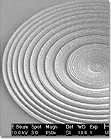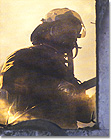|
 Professor Anthony Ephremides (Electrical and Computer Engineering [ECE] and Institute for Systems Research [ISR]) and Professor Sennur Ulukus (ECE) are part of a recently announced Department of Defense Multidisciplinary University Research Initiative (MURI) grant under the Army Research Office topic "Cross Disciplinary Approach to Modeling, Analysis and Control." The name of their project is "DAWN: Dynamic Ad-hoc Wireless Networking." The lead institution is the University of California, Santa Cruz, where J.J. Garcia-Luna-Aceves is the principal investigator. The grant provides for up to five years and $5 million in funding, and the Maryland team's portion represents about 20 percent of the total. The project will address energy efficiency, cross-layer optimization, interaction between physical layer, MAC, routing, compression, and scalability of protocols. In addition, special attention will be given to sensor networks where there is a need to map mission-specific performance measures to classical networking performance metrics. Dr. Ephremides is the principal investigator for the Maryland portion of the MURI. Professor Anthony Ephremides (Electrical and Computer Engineering [ECE] and Institute for Systems Research [ISR]) and Professor Sennur Ulukus (ECE) are part of a recently announced Department of Defense Multidisciplinary University Research Initiative (MURI) grant under the Army Research Office topic "Cross Disciplinary Approach to Modeling, Analysis and Control." The name of their project is "DAWN: Dynamic Ad-hoc Wireless Networking." The lead institution is the University of California, Santa Cruz, where J.J. Garcia-Luna-Aceves is the principal investigator. The grant provides for up to five years and $5 million in funding, and the Maryland team's portion represents about 20 percent of the total. The project will address energy efficiency, cross-layer optimization, interaction between physical layer, MAC, routing, compression, and scalability of protocols. In addition, special attention will be given to sensor networks where there is a need to map mission-specific performance measures to classical networking performance metrics. Dr. Ephremides is the principal investigator for the Maryland portion of the MURI.
 Assistant Professor Reza Ghodssi (ECE and ISR) has received a Research Opportunities in Space and Science 2004 award for Phase Fresnel Lens development. The program had significant visibility at NASA this year, in part due to important contributions from two of Ghodssi's graduate students, Brian Morgan and Mike Waits. Waits is currently working full time at the Army Research Laboratory while also a Ph.D. student in the Electrical and Computer Engineering department. Assistant Professor Reza Ghodssi (ECE and ISR) has received a Research Opportunities in Space and Science 2004 award for Phase Fresnel Lens development. The program had significant visibility at NASA this year, in part due to important contributions from two of Ghodssi's graduate students, Brian Morgan and Mike Waits. Waits is currently working full time at the Army Research Laboratory while also a Ph.D. student in the Electrical and Computer Engineering department.

The University of Maryland Center for Firefighter Safety Research and Development located at the Maryland Fire and Rescue Institute (MFRI) has been awarded a $750,000 FIRE Act grant. The grant, offered through the Assistance to Firefighters Grant Program of the U.S. Department of Homeland Security, will fund research in firefighter safety, including the use of technology to locate firefighters and monitor their health and safety during emergencies. It is the highest award available from the program, and the first time it has been bestowed to fund research and development of new equipment rather than the acquisition of equipment.
 A research team led by Professor Joseph JaJa (ECE and University of Maryland Institute for Advanced Computer Studies) has received a grant from the National Science Foundation and Library of Congress to fund digital preservation research. The grant was awarded to the group "for exploring automated collection and verification methods for distributed digital collections." The group's new management architecture will create a secure archive that provides producers, site administrators, and preservation managers key functionalities for the long-term access and preservation of digital assets. Dr. JaJa's group was one of eleven university digital preservation teams to receive an award. A research team led by Professor Joseph JaJa (ECE and University of Maryland Institute for Advanced Computer Studies) has received a grant from the National Science Foundation and Library of Congress to fund digital preservation research. The grant was awarded to the group "for exploring automated collection and verification methods for distributed digital collections." The group's new management architecture will create a secure archive that provides producers, site administrators, and preservation managers key functionalities for the long-term access and preservation of digital assets. Dr. JaJa's group was one of eleven university digital preservation teams to receive an award.
 Assistant Professor Pamela Abshire (ECE and ISR) is the principal investigator for a National Science Foundation award for "Integrated Transduction, Actuation, and Control for Cell-Based Sensing." Assistant Professor Benjamin Shapiro (Aerospace Engineering and ISR) and Associate Professor Elisabeth Smela (Mechanical Engineering) are the co-principal investigators for this award. The researchers will develop and demonstrate enabling technology for cell-based sensing, which has a potential for selectivity, sensitivity and speed that far exceeds current chemical and biological sensors. In addition to olfactory sensing and pathogen detection for national security, this technology has applications in health care, pharmaceutical development and environmental monitoring. The researchers' integrated transduction-actuation-control approach also could have an impact on labs-on-a-chip, microfluidics, and nanotechnology by developing basic technology and techniques for sophisticated manipulation of particles at the micro-scale. Assistant Professor Pamela Abshire (ECE and ISR) is the principal investigator for a National Science Foundation award for "Integrated Transduction, Actuation, and Control for Cell-Based Sensing." Assistant Professor Benjamin Shapiro (Aerospace Engineering and ISR) and Associate Professor Elisabeth Smela (Mechanical Engineering) are the co-principal investigators for this award. The researchers will develop and demonstrate enabling technology for cell-based sensing, which has a potential for selectivity, sensitivity and speed that far exceeds current chemical and biological sensors. In addition to olfactory sensing and pathogen detection for national security, this technology has applications in health care, pharmaceutical development and environmental monitoring. The researchers' integrated transduction-actuation-control approach also could have an impact on labs-on-a-chip, microfluidics, and nanotechnology by developing basic technology and techniques for sophisticated manipulation of particles at the micro-scale.
|
